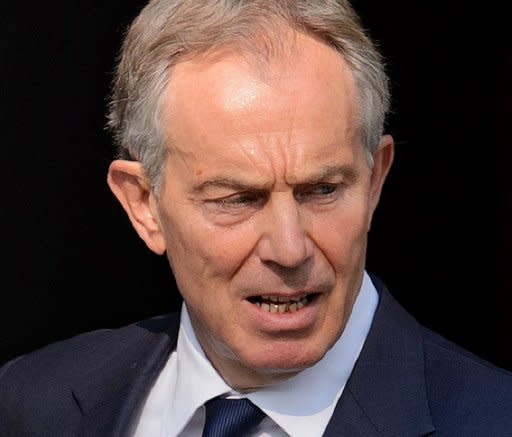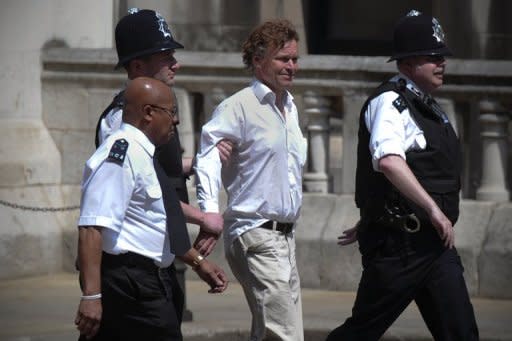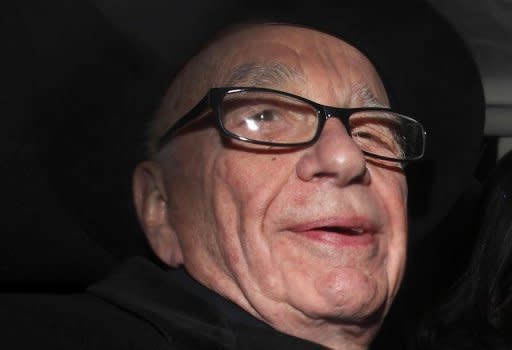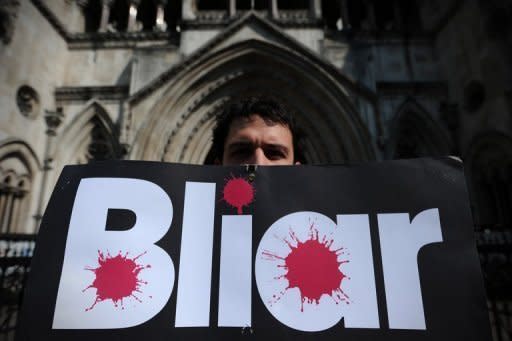Blair admits being too close to Murdoch
Former British prime minister Tony Blair told a press ethics inquiry Monday that he got too close to Rupert Murdoch's media empire, as a protester stormed in and branded him a "war criminal". Blair said it was inevitable that top politicians and media executives had a close interaction as he defended the way he courted Murdoch before and during his time in office from 1997 to 2007. Blair said he had made a strategic decision not to take on the power of the press during that time, despite calls for tougher media regulation following the death of Diana, princess of Wales in 1997. The 59-year-old said that had he done so, the "absolute major confrontation" required would come at the price of shelving his programme for office, which he felt was a bigger priority. And he said the consequence of falling out with media chiefs would have been an all-out, lifelong, ferocious attack. Blair said the chief problem with the British press was the blurring of boundaries between news and comment in some papers, where reporting is twisted into an "instrument of political power". He said the crossover had turned into a "very violent and aggressive" genre of attack. But his message was interrupted by film-maker David Lawley Wakelin, who somehow emerged from the judges' area to harangue Blair. "This man should be arrested for war crimes," he yelled, in reference to Blair sending Britain to war in Iraq during his time in office. Wakelin was hustled out within 30 seconds but judge Brian Leveson, who is heading the inquiry, apologised to Blair and immediately ordered an investigation into how the protester had gained access to a secure area. He was arrested on suspicion of a breach of the peace but was later released with no further action. Asked whether he had got too close to Murdoch's British publishing arm News International, Blair replied: "Yes." But he added: "I don't know a policy that we changed as a result of Rupert Murdoch." Then-opposition leader Blair flew to Australia to meet Murdoch in 1995, with the "very deliberate and strategic" aim of persuading his News Corporation empire against "tearing us to pieces". Blair faced questions about claims of back-room deals with Murdoch on policies such as maintaining restrictions on trade unions and rejecting tougher media ownership rules. He said there was no deal in exchange for Murdoch's support, saying the media baron "never made such an approach to me". He said he "understood why these conspiracy theories arise" but added: "Our views may have coincided but I believed in what I was doing. I didn't need anybody else to tell me what to do." In three phone calls with Murdoch in March 2003 ahead of the US-led invasion of Iraq, Blair said he would simply have been explaining his viewpoint. "I wouldn't say there's anything particularly unusual or odd about that when you're facing such a huge issue," the 59-year-old said. "I would describe my relationship with him as a working relationship, until after I left office. "It was a relationship about power. "These relationships are not personal, they are working, to me." On being godfather to 10-year-old Grace Murdoch, the second youngest of the media baron's six children, Blair said his relationship with Rupert Murdoch changed after he left power. "I would never have become godfather to his child on the basis of my relationship with him in office," he said. Blair also admitted a friendship with Murdoch's former close aide Rebekah Brooks, who has been charged with conspiracy to pervert the course of justice over the phone-hacking scandal at Murdoch's now-closed News of the World tabloid. The Leveson Inquiry was set up by current Prime Minister David Cameron in July 2011 as the phone-hacking scandal escalated, and is currently examining the links between politicians and the media. Although he denied changing policies because of media pressure, Blair said he had been driven to sack ministers even when he was not convinced it was justified, as he had been trapped by "the vehemence of the headlines". On British press culture, he said the pressure of a 24-hour news cycle meant the environment was "far more raw, brutal and, in a sense, crude". Blair, now a Middle East peace envoy, said some journalists had waged a "personal vendetta" against his wife Cherie. "The attacks on her and my children were unnecessary and wrong. "I just don't think it is part of the political debate," he said. When the British press "go for you" it is "full-on", he said. "That's not journalism. In my view it's an abuse of power."






